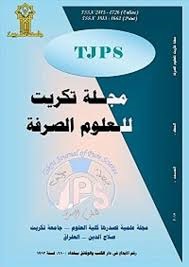Abstract
This paper presents the results of radon level in drinking water in Erbil governorate and its districts. The measurements
were carried out on 42 samples (tap water) of 21 major areas, and alpha track detectors (type CR-39) were used for the
estimations. The average values for radon concentration of tap water were variable from the district to another, and it
was found to be (4.693±2.213 Bq/l) with a maximum of 9.61Bq/L in Hugran region and minimum of 2.01 Bq/L in HajiOmaran city. In addition, the average annual effective doses, and equilibrium factor between radon and its daughter
were measured in each area and it was found to be (11.546±8.566 µSv/Yr) and (0.204±0.06) respectively. On the other
hand, this paper presents an evaluation of the inhalation and ingestion doses from exposure to radon and also the
contribution of radon concentration in drinking water to indoor radon concentration was estimated. When the results
were compared with the internationally recommended reference levels (U.S Environmental Protection Agency limit
11.1 Bq/l), there were no indications of existence of radon problems in the water sources in this survey. therefore the
drinking water in Erbil governorate is safe as far as radon concentration is concerned
were carried out on 42 samples (tap water) of 21 major areas, and alpha track detectors (type CR-39) were used for the
estimations. The average values for radon concentration of tap water were variable from the district to another, and it
was found to be (4.693±2.213 Bq/l) with a maximum of 9.61Bq/L in Hugran region and minimum of 2.01 Bq/L in HajiOmaran city. In addition, the average annual effective doses, and equilibrium factor between radon and its daughter
were measured in each area and it was found to be (11.546±8.566 µSv/Yr) and (0.204±0.06) respectively. On the other
hand, this paper presents an evaluation of the inhalation and ingestion doses from exposure to radon and also the
contribution of radon concentration in drinking water to indoor radon concentration was estimated. When the results
were compared with the internationally recommended reference levels (U.S Environmental Protection Agency limit
11.1 Bq/l), there were no indications of existence of radon problems in the water sources in this survey. therefore the
drinking water in Erbil governorate is safe as far as radon concentration is concerned
